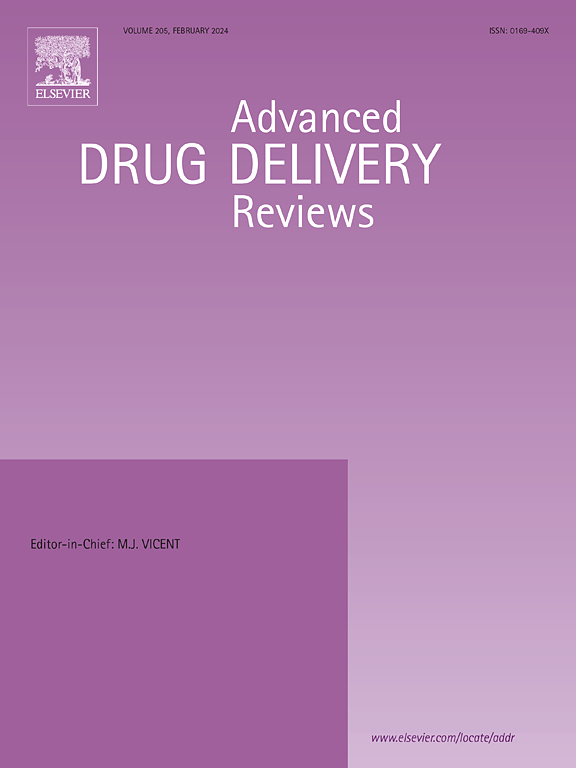胰腺导管腺癌的肿瘤微环境亚型:个性化治疗策略的新途径
IF 17.6
1区 医学
Q1 PHARMACOLOGY & PHARMACY
引用次数: 0
摘要
在过去的十年中,单细胞分解方法已经揭示了胰腺导管腺癌(PDAC)的广泛异质性,重塑了我们对这种复杂实体肿瘤的理解。PDAC实体在肿瘤和基质水平上表现出肿瘤内和肿瘤间的异质性,转化为不同的生态系统和功能,最终影响疾病进展和治疗反应。越来越多的证据表明,特定的基因改变如何驱动独特的肿瘤微环境景观,影响成纤维细胞编程、免疫细胞环境和细胞外基质重塑。在这篇综述中,我们强调了解读和分层异质肿瘤-基质网络的重要性,并概述了连接肿瘤身份和基质表型的复杂串扰。我们进一步讨论了多细胞亚型的概念和空间组织在塑造患者结果中的作用,以完善预后和治疗分层。最后,我们探讨了现有的和潜在的治疗策略,旨在针对肿瘤内在和基质外在脆弱性,提供了可以提高量身定制的治疗方案的有效性的方法。通过整合这些观点,我们的目标是为PDAC中推进精准医学提供一个全面的框架。本文章由计算机程序翻译,如有差异,请以英文原文为准。


Tumor microenvironment subtyping in pancreatic ductal adenocarcinoma: New avenues for personalized therapeutic strategies
In the past decade, single-cell-resolved approaches have uncovered the extensive heterogeneity of pancreatic ductal adenocarcinoma (PDAC), reshaping our understanding of this complex solid tumor. PDAC entities exhibit both intra- and inter-tumor heterogeneity at the tumor and stromal levels, translating into distinct ecosystems and functions, ultimately impacting disease progression and treatment response. Increasing evidence highlights how specific genetic alterations drive unique tumor microenvironment landscapes, affecting fibroblast programming, immune cell contexture and extracellular matrix remodeling. In this review, we emphasize the importance of deciphering and stratifying heterogeneous tumor-stroma networks and provide an overview on the intricate crosstalk linking tumor identity and stromal phenotype. We further discuss the concept of multicellular subtyping and the role of spatial organization in shaping patient outcomes to refine prognostic and therapeutic stratification. Lastly, we explore existing and potential therapeutic strategies aimed at targeting both tumor-intrinsic and stromal-extrinsic vulnerabilities, offering insights into approaches that could enhance the efficacy of tailored treatment schemes. By integrating these perspectives, we aim to provide a comprehensive framework for advancing precision medicine in PDAC.
求助全文
通过发布文献求助,成功后即可免费获取论文全文。
去求助
来源期刊
CiteScore
28.10
自引率
5.00%
发文量
294
审稿时长
15.1 weeks
期刊介绍:
The aim of the Journal is to provide a forum for the critical analysis of advanced drug and gene delivery systems and their applications in human and veterinary medicine. The Journal has a broad scope, covering the key issues for effective drug and gene delivery, from administration to site-specific delivery.
In general, the Journal publishes review articles in a Theme Issue format. Each Theme Issue provides a comprehensive and critical examination of current and emerging research on the design and development of advanced drug and gene delivery systems and their application to experimental and clinical therapeutics. The goal is to illustrate the pivotal role of a multidisciplinary approach to modern drug delivery, encompassing the application of sound biological and physicochemical principles to the engineering of drug delivery systems to meet the therapeutic need at hand. Importantly the Editorial Team of ADDR asks that the authors effectively window the extensive volume of literature, pick the important contributions and explain their importance, produce a forward looking identification of the challenges facing the field and produce a Conclusions section with expert recommendations to address the issues.

 求助内容:
求助内容: 应助结果提醒方式:
应助结果提醒方式:


